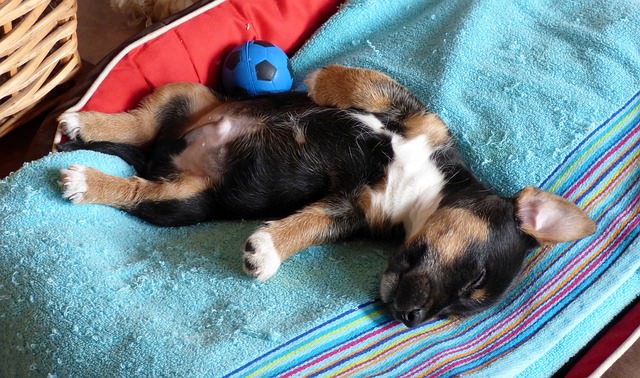You’re about to fall asleep with your pup curled up by your side, but all of a sudden, a huff, wheeze, and snore scares away those much-needed Z’s. Listening to your sleepy pup let out soft little snores is cute at first, but it soon loses its appeal when it starts to keep you up at night.
As with humans, there are a number of reasons why dogs snore. Snub-nose dog breeds like Pugs, Boston Terriers, and Bulldogs are more likely to snore because of their restricted windpipes, but every kind of dog has been known to snuffle while they sleep. If you’ve got a four-legged snorer in your household, try these tips to keep them quiet.
#1 – Keep Things Clean

Like people, many dogs suffer from allergies that affect the respiratory system. Your dog could be allergic to anything from corn to grass, but the biggest culprits when it comes to snoring are everyday dust and pollen. You can alleviate your dog’s allergy symptoms by keeping their space allergen-free. Wash or change their bedding every day and vacuum carpets frequently. You can also schedule your walks for when the pollen count is low and there’s not a lot of wind or traffic that could send those particles up your dog’s sniffer.
#2 – Adjust Their Sleeping Position

Snoring happens when air passages are blocked or narrowed, and your dog’s sleeping position may be a contributing factor. If your dog snores while he’s sprawled out on his back, rolling him over to his side might instantly solve the problem. But before you reach over to prod your pup into a better position, remember how you feel when someone wakes you up in the middle of the night. Even the most well-tempered dogs can lash out aggressively when disturbed from their beauty sleep, so be slow and gentle when easing them awake and guide them to roll over.
#3 – Help Them Lose Weight

Pet obesity comes with a long list of potential health risks, and it’s also been determined that being overweight can be a direct cause of snoring. Those extra pounds aren’t just in their bellies, and overweight dogs usually have excess tissue around their neck and throat. That double chin that looks so cute could actually be partially obstructing your dog’s airflow and causing him to snore. Put him on a healthy diet and commit to regular exercise to help him shed those extra pounds.
#4 – Stop Smoking

Tobacco smoke irritates your dog’s respiratory system in ways you probably didn’t think about. Not only do pets suffer from secondhand smoke as much as humans do, breathing in those fumes will also contribute to their snoring problems. If you’re not willing to put down the pack for good, at least make the effort to not smoke near your dog or near any of things he frequently comes in contact with.
#5 – Visit The Vet

For dogs genetically predisposed to snoring, minor surgery may be the best way to improve their breathing. Soft pallet surgery is a relatively simple procedure that removes some of the excess flesh that blocks the airway. As the dog ages, that flesh will droop and be even more of a nuisance. Veterinarians usually recommend the surgery for puppies to prevent future problems. It can be expensive, but you’ll have a better night’s sleep, and your dog will feel better and be able to breathe easier.
